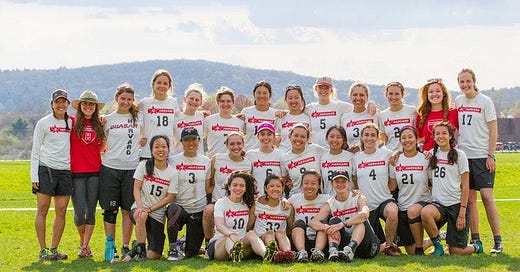I tore my ACL earlier this summer, and I’m finally getting surgery next week. I injured it playing ultimate frisbee, a sport I’ve played since college (picture above is a team photo back when I played on Harvard Quasar!) and play three times a week in adult leagues and pickup games in LA. I’ve finally come to terms with the fact that I’ll be out from any active field sports for at least 12 months post-surgery.
This is the most significant setback in my athletic career, and it’s been a long journey (which I’ll share more about another day). I’ve gone through the entire grief cycle - denial, anger, bargaining, depression, and acceptance - many times over. I’ve talked to friends, watched countless ACL recovery vlogs and articles, dug down the rabbit holes of Reddit to get there, and I’m happy that I’m finally able to write this post with genuine excitement about the recovery journey ahead.
The biggest thing the injury has made me realize is that the ability to be active and be an athlete is still a huge part of my identity.
I haven’t shared much about my past competitive badminton life, or even my ultimate frisbee days, but when I posted about badminton earlier in July on Linkedin, I received an overwhelming amount of support and kind notes from friends and people I hadn’t heard from in a very long time. From that point, I was encouraged to explore my identity as an athlete even more.
You see, I’m still really active. I still identify very strongly as an athlete - I wake up at 430am to train, run 5 times a week, do pilates / HIIT, dabble in swimming and golf, and am addicted to ensuring I complete all my daily Apple Watch rings. I don’t train for aesthetic reasons or any specific fitness goals. But since I no longer have real competitions, I honestly hadn’t ever had the space to think about why I still train the way I did when I was still competing (but without the disciplined nutrition, coaching, and necessary recovery to sustain).
Until my injury.
This ACL injury coupled with the recent retirement of tennis legends Serena Williams + Federer has made me reflect a lot on how the athlete’s mindset impacts my motivations in work + life and how I cope with setbacks.
The Athlete’s Mindset
In sports (and frankly in life), it’s often said - hard work leads to success. To be the best and to compete in the highest levels of competition, you need to want it so badly that you’re willing to make significant tradeoffs in your life.
I’ve found that athletes tend to think of things in the extremes. We push our bodies to physical and mental extremes to win. Because winning the game is one of the most important things we can achieve.
But injury forces you to take a break. It’s a setback for any athlete.
At first, I denied my injury. It didn’t hurt as much as I thought an ACL tear should, so I delayed getting an MRI. But now, instead of viewing the injury as a setback, I’m learning to view it as an opportunity. My friend Jonathan framed it as “an unprecedented opportunity to exercise other parts of my life and learn new things, almost like cross-training.”
I’m learning how to embrace the idea of recovery more in my life. I know I want to continue being active for the long term and do my best to prevent injury. When competing, I like to visualize what success looks like when I perform my best. I’ve found it helpful to try imagining what it’ll look like to regain full extension of my knee and go back to the field instead of focusing on the negatives of what I can’t accomplish while I’m injured.
I’m excited to exercise other parts of my life. I’ve recently dug up a lot of my rusty statistics + data science skills and have been diving head first into all the cool new data infrastructure tools and efforts in AI. I’m working on recording more video content through our Slope interview series and will continue to write actively. I’ve also found so much joy in catching up with old friends and meeting new ones, so if you’re reading this, please don’t hesitate to reach out :)




